What is a Psoriasis?
Psoriasis is a skin condition that typically appears as red, flakey patches of skin covered with a scaly silvery-white rash called plaques. The knees, elbows, scalp, and lower back are usually the most affected areas, but psoriasis can appear anywhere on the body. While psoriasis can be uncomfortable or even painful, that is not the only challenge this condition creates for the afflicted. Visible skin lesions may lead to self-consciousness, embarrassment, and poor self-image. While psoriasis cannot be transmitted to other people, the appearance of lesions can lead to misunderstandings in social situations.
There are treatments available to help control and put your psoriasis into remission.
Psoriasis treatments can include topical therapy, oral therapy, injectable therapy, and UV Light. Here are some treatments that Epiphany Dermatology provides.
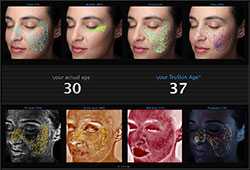
Visia Skin Analysis: Epiphany Dermatology uses VISIA Skin Analysis System imaging system to provide an easy-to-understand, objective evaluation of your skin. The analysis is used to help you select the best treatments, skin care regimens, and skin care products for your individual skin care needs.
UV Light Therapy: UV Light Therapy, or phototherapy, involves exposing affected skin to ultraviolet light on a regular basis and under medical supervision. Epiphany Dermatology offers advanced UV light therapy treatment using narrow-band, ultraviolet light (UVB.) UVB is especially therapeutic for psoriasis patients, because it slows the growth of skin cells. At the same time, the body’s vitamin D production is stimulated by light therapy to promote healthy skin growth. UV light therapy offers dual therapeutic effects for the care of psoriasis.
This treatment can be individualized to discrete, localized, areas using our laser or, for patients who have widespread involvement, our stand-up, total-body, light box. This treatment differs from tanning beds, and natural sunlight, because it uses a single, effective wavelength proven to aid in treatment of psoriasis. Using this highly-customized single wavelength, UV light therapy offers a safer alternative to tanning beds, or sunlight by decreasing the risk of skin cancer and premature skin aging. Phototherapy is the primary treatment for psoriasis and can be used as an adjunct treatment to topical medication. The setting and frequency of treatment are carefully designed to meet each patient’s needs.
 Skin Care Products: Dermatology tested and approved, our skin care products can treat a variety of skin problems, including Psoriasis. SHOP NOW
Skin Care Products: Dermatology tested and approved, our skin care products can treat a variety of skin problems, including Psoriasis. SHOP NOW
Medications: In more severe cases, our Board-Certified Dermatologists may prescribe oral/topical medications or an injectable therapeutic regime.
How Psoriasis Can Affect the Skin?
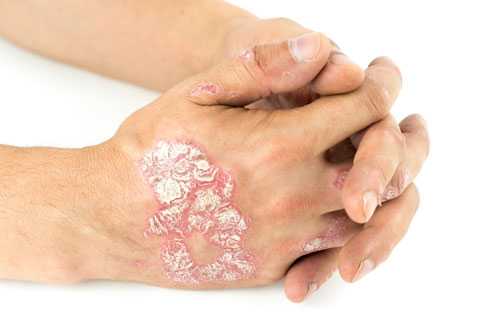 Psoriasis is an autoimmune condition caused when the immune system’s t-cells mistakenly attack the body’s healthy skin cells. This, in turn, causes the body to produce skin cells at an accelerated rate. In the body of someone without psoriasis, the production of new skin cells, regeneration, occurs over about a month. However, the body of someone with psoriasis produces the same amount of new skin cells in only three to seven days. While the cells are being produced so quickly, the old skin cells have less time to slough off naturally. As more layers of skin cells build up, the crusty, enflamed, patches of skin develop into plaques. As with other auto-immune conditions, a variety of factors can trigger a “flare-up” or an increase in the severity of symptoms; in this case, the number and size of plaques.
Psoriasis is an autoimmune condition caused when the immune system’s t-cells mistakenly attack the body’s healthy skin cells. This, in turn, causes the body to produce skin cells at an accelerated rate. In the body of someone without psoriasis, the production of new skin cells, regeneration, occurs over about a month. However, the body of someone with psoriasis produces the same amount of new skin cells in only three to seven days. While the cells are being produced so quickly, the old skin cells have less time to slough off naturally. As more layers of skin cells build up, the crusty, enflamed, patches of skin develop into plaques. As with other auto-immune conditions, a variety of factors can trigger a “flare-up” or an increase in the severity of symptoms; in this case, the number and size of plaques.
What are Common Types of Psoriasis and their Symptoms?
Psoriasis can vary greatly in presentation from person to person. The symptoms and their severity are dependent on the type of psoriasis they have and its location on their body. Here is a list of the most common types of psoriasis.
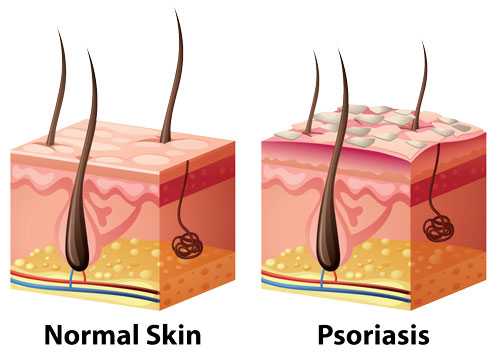
Plaque Psoriasis: Plaque psoriasis is the most common type of psoriasis. Of those afflicted, 80 to 90 percent of them will have this type. Plaque psoriasis often appears on the hands, elbows, knees, scalp, and lower back. Common symptoms seen in patients with plaque psoriasis are:
Plaques: Areas of raised skin
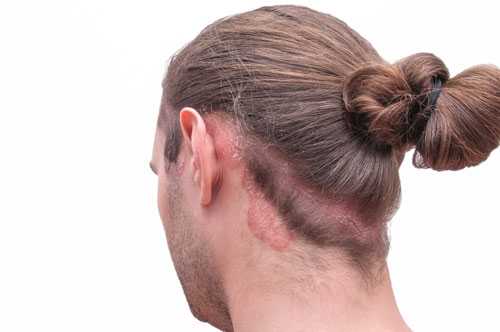 Scalp Psoriasis: This kind of psoriasis can flare-up partially, or completely, on the scalp. In many cases, it has the same symptoms as plaque psoriasis; however, in severe cases it may lead to hair loss.
Scalp Psoriasis: This kind of psoriasis can flare-up partially, or completely, on the scalp. In many cases, it has the same symptoms as plaque psoriasis; however, in severe cases it may lead to hair loss.
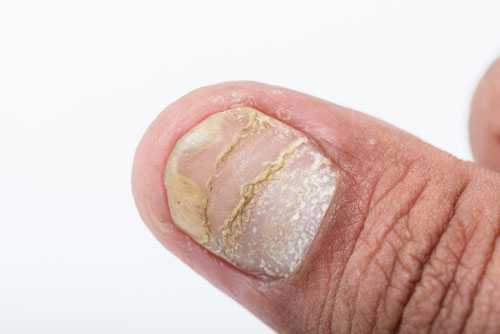 Nail Psoriasis: The nails are adversely affected in almost half of all psoriasis patients. Nailbeds become fragile, discolored and, sometimes, deeply disfigured. The nails may separate from the nail bed, or crumble completely.
Nail Psoriasis: The nails are adversely affected in almost half of all psoriasis patients. Nailbeds become fragile, discolored and, sometimes, deeply disfigured. The nails may separate from the nail bed, or crumble completely.
Scales: Dry silvery-white pry patches on the skin
Itching
Cracking and Bleeding Skin
Dry Skin
Psoriatic Arthritis: Some people develop swelling and stiffening of their joints as a direct result of their Psoriasis
Guttate Psoriasis: Common among children and teenagers, guttate psoriasis appears as small red raised bumps. It sometimes appears in conjunction with a streptococcus infection (strep throat). In some cases, it goes on to develop into persistent, plaque psoriasis.
Inverse Psoriasis: Commonly developing in areas where skin is contact with other skin, inverse psoriasis is found around skin creases and folds such as armpits, buttocks and genitals. This form of psoriasis often appears with raw, smooth, raised, patches of skin become painful to the touch. Since these body areas experience greater friction, inverse psoriasis usually doe not present with plaques, silvery white scales, more common with plaque psoriasis.
Pustular Psoriasis: This painful type of Psoriasis starts in the hands and feet. The affected areas appear red and swollen with multiple pus-filled bumps. These areas do not contain any infection, only the body’s reaction to itself. Because of inflammation, any activity performed with the affected area is highly painful.
What Can Trigger a Psoriasis Outbreak
Although the origins of autoimmune conditions like psoriasis are not completely understood, a person’s psoriasis can flare up if they are exposed to external conditions. The potential causes of “flare-ups” are often referred to as “triggers.” Some common triggers are:
 Smoking: Smoking has been linked to psoriasis flare-ups. This could be because nicotine alters the body’s immune function and the smoke itself causes oxidative stress on the skin cells. Chronic smokers are twice as likely to develop severe psoriasis flare-ups.
Smoking: Smoking has been linked to psoriasis flare-ups. This could be because nicotine alters the body’s immune function and the smoke itself causes oxidative stress on the skin cells. Chronic smokers are twice as likely to develop severe psoriasis flare-ups.
 Alcohol: Excessive alcohol consumption has been linked to psoriasis flare-ups. Although exact correlation is unknown, the Journal of the European Academy of Dermatology and Venerology performed a review of 23 different studies researching the link.ii Out of these studies 18 of 23 noted a connection between chronic alcohol consumption and psoriasis.
Alcohol: Excessive alcohol consumption has been linked to psoriasis flare-ups. Although exact correlation is unknown, the Journal of the European Academy of Dermatology and Venerology performed a review of 23 different studies researching the link.ii Out of these studies 18 of 23 noted a connection between chronic alcohol consumption and psoriasis.
 Stress: Higher stress levels have been known to affect many organ systems including the integumentary (skin) system. Not only have there been increased instances of skin outbreaks like acne during periods of high stress, doctors and patients have often noted higher occurrences of psoriasis flare-ups. The impact of stress can be significant because some coping mechanisms, such as excessive alcohol consumption and smoking, can further trigger psoriasis flare-ups.
Stress: Higher stress levels have been known to affect many organ systems including the integumentary (skin) system. Not only have there been increased instances of skin outbreaks like acne during periods of high stress, doctors and patients have often noted higher occurrences of psoriasis flare-ups. The impact of stress can be significant because some coping mechanisms, such as excessive alcohol consumption and smoking, can further trigger psoriasis flare-ups.
 Physical Trauma: Physical damage to the skin, such as cuts, bruises, burns, scratches, etc., have been known to cause Psoriasis flare-up at the site of the injury. In the injured area the skin’s response to heal itself promotes an overgrowth of skins cells. Lesions and plaques at the affected site. This overgrowth response is called the Koebner phenomenon
Physical Trauma: Physical damage to the skin, such as cuts, bruises, burns, scratches, etc., have been known to cause Psoriasis flare-up at the site of the injury. In the injured area the skin’s response to heal itself promotes an overgrowth of skins cells. Lesions and plaques at the affected site. This overgrowth response is called the Koebner phenomenon
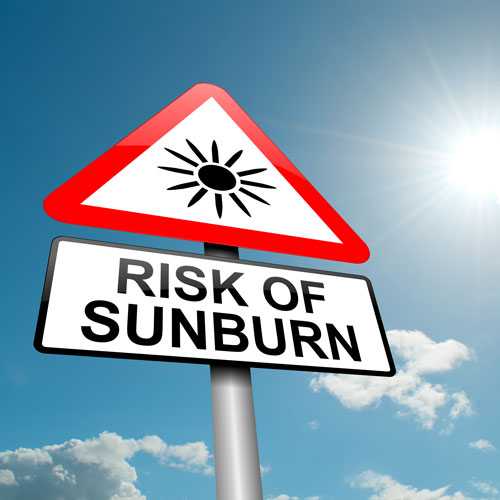 Sunburn: Exposure to the sun in small doses can be very therapeutic for a person with Psoriasis. Ultraviolet Beta Rays UVB can slow skin cell replication which helps psoriasis and vitamin D from sunlight stimulates healthy skin cell growth. However, overexposure of sunlight can cause a sunburn which can stimulate Psoriasis flare-up called a Koebner phenomenon. To avoid sun burns, Epiphany Dermatology recommends Eclipse
Sunburn: Exposure to the sun in small doses can be very therapeutic for a person with Psoriasis. Ultraviolet Beta Rays UVB can slow skin cell replication which helps psoriasis and vitamin D from sunlight stimulates healthy skin cell growth. However, overexposure of sunlight can cause a sunburn which can stimulate Psoriasis flare-up called a Koebner phenomenon. To avoid sun burns, Epiphany Dermatology recommends Eclipse
Rx, a wearable UV monitor device to keep track of your sun exposure and wear a broad-spectrum sunscreen of SPF of 30 or higher.
 Weather Changes: Dry and cold weather changes is known to cause dry skin. The occurrence of raw, cracked, and irritated skin increases dramatically with exposure to harsh weather conditions. Dry and damaged skin stimulates cellular reproduction of the skin cells, sending the body into overdrive and acting as a trigger for a potential psoriasis flare-up.
Weather Changes: Dry and cold weather changes is known to cause dry skin. The occurrence of raw, cracked, and irritated skin increases dramatically with exposure to harsh weather conditions. Dry and damaged skin stimulates cellular reproduction of the skin cells, sending the body into overdrive and acting as a trigger for a potential psoriasis flare-up.
Infection: Psoriasis is widely understood as an autoimmune condition. The skin itself, is the first line of defense against most infections. Therefore, anything that can affect the immune system can cause a psoriasis outbreak. A streptococcus infection (such as strep throat), for example, has been linked to outbreaks of Guttate Psoriasis, especially in children and teens.
Certain Medications: Many medications improve our health and quality of life, but certain types of medication may cause skin-related, side effects in people living with psoriasis. Examples of medication which could trigger a psoriasis flare-up include:
Atenolol
Metoprolol
Propranolol
Naproxen
Indomethacin
Lithium
Fluoxetine
Plaquenil
Quinacrine
Chloroquine
Hydroxychloroquine
Quinidine
*Ask your Doctor or Pharmacists if your medication has a risk of side effects that could affect your skin health *
Schedule Your Psoriasis Treatments at Epiphany Dermatology – Kansas City
Psoriasis Treatments are performed by Licensed Aestheticians overseen by Board-Certified Dermatologists at both our Riverside and St. Joseph, MO Locations.
Our Riverside Location:
805 NW Platte Rd., Suite 120
Riverside, MO 64150 | CLICK HERE for Directions
Phone: (816) 205-8120
SEND US AN E-MAIL
Our St. Joseph Location:
805 N 36th St., Suite D
St. Joseph, MO 64506 | CLICK HERE for Directions
Phone: (816) 205-8120
SEND US AN E-MAIL

